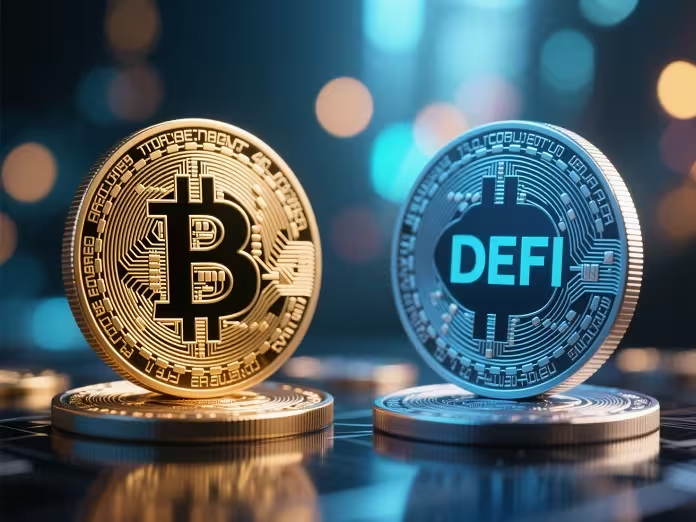
The digital finance world can feel like a maze of buzzwords and revolutionary promises. Two terms that often leave newcomers scratching their heads are “cryptocurrency” and “DeFi.” While they’re deeply connected, understanding their fundamental differences could be the key to unlocking your next investment opportunity—or avoiding a costly mistake: Cryptocurrency vs Defi.
Breaking Down the Basics: What Is Cryptocurrency?
Cryptocurrency represents digital money built on blockchain technology. Think of it as the foundation layer of the entire digital finance ecosystem. Bitcoin, launched in 2009, became the first successful cryptocurrency, proving that digital money could exist without banks or governments controlling it.
When you own cryptocurrency, you’re holding digital tokens that derive their value from various factors: scarcity, utility, market sentiment, and adoption rates. These tokens can serve multiple purposes—from simple peer-to-peer payments to powering complex blockchain networks.
The cryptocurrency vs DeFi debate often starts here because many people assume they’re the same thing. However, cryptocurrency is actually the fuel that powers much larger financial innovations.
DeFi: The Financial Revolution Built on Crypto
Decentralized Finance, or DeFi, represents an entirely new financial system built using cryptocurrency and blockchain technology. If cryptocurrency is digital money, then DeFi is the digital bank, stock exchange, insurance company, and lending platform all rolled into one—but without traditional intermediaries.
DeFi applications, often called “dApps,” recreate traditional financial services using smart contracts. These self-executing contracts automatically enforce agreements without requiring banks, brokers, or other middlemen. The result? Financial services that theoretically run 24/7, offer global access, and operate with unprecedented transparency.
Popular DeFi platforms like Uniswap facilitate cryptocurrency trading, while others like Compound enable users to lend and borrow digital assets. Each platform uses cryptocurrency tokens both as the medium of exchange and often as governance tokens that give holders voting rights over platform decisions.
The Cryptocurrency vs DeFi Relationship Explained
Understanding the relationship between cryptocurrency and DeFi requires recognizing their interdependence. Cryptocurrency provides the infrastructure and medium of exchange, while DeFi builds sophisticated financial products on top of that infrastructure.
Consider this analogy: if cryptocurrency is like having gold coins, then DeFi is like having banks, investment firms, and trading platforms that use those gold coins. The coins have value independently, but their utility multiplies dramatically when integrated into a broader financial ecosystem.
This symbiotic relationship explains why the cryptocurrency vs DeFi comparison isn’t really about choosing sides—it’s about understanding how different layers of the digital finance stack work together.
Key Differences That Actually Matter
- Purpose and Function
Cryptocurrency primarily serves as digital money or store of value. Bitcoin aims to be digital gold, while Ethereum powers a global computer network. DeFi applications, however, focus on recreating and improving traditional financial services through decentralization.
- Complexity Levels
Buying and holding cryptocurrency requires basic technical knowledge—creating a wallet, understanding private keys, and navigating exchanges. DeFi participation demands significantly more sophistication, including understanding smart contracts, yield farming strategies, and complex tokenomics.
- Risk Profiles
While both carry substantial risks, they manifest differently. Cryptocurrency risks center on price volatility, regulatory changes, and technology adoption. DeFi risks include all cryptocurrency risks plus smart contract vulnerabilities, protocol governance issues, and “rug pull” scams where developers abandon projects with user funds.
- Investment Approaches
Cryptocurrency investment often follows traditional asset allocation strategies—buy, hold, and diversify across different tokens. DeFi investment requires active participation: providing liquidity, staking tokens, participating in governance, and constantly monitoring protocol changes and opportunities.
Real-World Applications: Where Each Shines
Cryptocurrency excels in scenarios requiring censorship-resistant transactions, cross-border payments, and long-term value storage. El Salvador’s adoption of Bitcoin as legal tender exemplifies cryptocurrency’s potential as sovereign money.
DeFi shines in providing financial services to underserved populations, enabling complex trading strategies, and creating new economic models. Yield farming, where users earn returns by providing liquidity to protocols, represents a financial innovation impossible in traditional systems.
The Future Landscape: Convergence or Competition?
The cryptocurrency vs DeFi narrative suggests competition, but reality points toward increasing integration. Traditional cryptocurrencies are incorporating DeFi features, while DeFi protocols are launching their own native tokens that function as standalone cryptocurrencies.
This convergence creates hybrid models where cryptocurrency holdings automatically generate yield through integrated DeFi protocols. Layer-2 solutions like Polygon are making DeFi more accessible by reducing transaction costs, potentially bringing these innovations to mainstream audiences.
Making Your Decision: Which Path Forward?
Your choice between focusing on cryptocurrency or DeFi should align with your financial goals, risk tolerance, and technical comfort level. Cryptocurrency offers a more straightforward entry point into digital assets, while DeFi provides opportunities for higher returns alongside significantly higher complexity and risk.
Consider starting with cryptocurrency to understand blockchain fundamentals before exploring DeFi applications. Many successful DeFi participants began as simple cryptocurrency holders who gradually learned about more complex protocols and strategies.
The cryptocurrency vs DeFi discussion ultimately highlights the evolution of digital finance from simple peer-to-peer payments to comprehensive financial ecosystems. Understanding both elements—and their intricate relationship—positions you to navigate this revolutionary landscape more effectively.
Whether you choose the relative simplicity of cryptocurrency investment or dive into DeFi’s complex but potentially rewarding protocols, remember that education and careful risk management remain your most valuable tools in this rapidly evolving space.




































